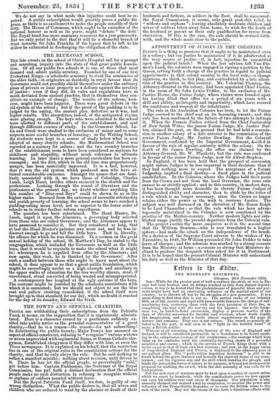APPOINTMENT OF JUDGES IN THE COLONIES.
JUSTICE is a thing so precious that it ought to be maintained even in a colony ; but can justice be maintained if it be adulterated at the very source of justice—if, in fact, injustice be committed upon the judicial bench ? When the last adviees left Van Die- men's Land, the colonists were engaged in signing a petition to the Queen, setting forth a change of the practice in regard to judicial appointments in that colony counter to the local rule,—a change injurious, we think, to fair play, and contradicted by a late altera- tion of the practice in this country. Mr. Valentine Fleming, the Attorney-General in the colony, had been appointed Chief Justice, in the room of Sir John Lewes Pedder, to the exclusion of Mr. Justice Horne, the Puisne Judge, whose claims were founded upon his having filled that office for a period of six years with a skill and ability, an integrity and impartiality, which have secured the confidence and respect of the inhabitants.
The rule in the Australian Colonies has been, to let the Puisne Judge succeed to the chief seat on its becoming vacant; and this rule has been confirmed by the failure of two attempts to infringe it. When Sir Francis Forbes retired from the Chief Justiceship of New South Wales, the junior Puisne Judge, Mr. Justice Bur- ton, claimed the post, on the ground that he had held a commis- sion in another colony of a date anterior to the commission of the senior Puisne Judge, Mr. Justice Dowling. But the Colonial Government, confirmed by the Imperial Government, decided in favour of the rule of regular seniority within the colony. On the death of Sir James Dowling, the office was claimed by the Attorney-General, Mr. W. Plunkett; but the rule was confirmed in favour of the senior Puisne Judge, now Sir Alfred Stephen.
In England, it has been held that the prospect of succession might induce Judges to be less impartial in their decisions than if they had nothing more to expect. The acceptance of a Puisne Judgeship implied a final destiny—a fixed place in the judicial constellation. In the Colonies, where the Judges hold their posts from the Crown and not from the local Governor, the same rule cannot be so strictly applied ; and in this country, in modern days, it has been thought more desirable to elevate Puisne Judges of distinguished ability and character, than to abide by the letter of a rule which is no longer necessary, since the Crown no longer retains either the power or the wish to overawe Justice. The subject was well discussed on the elevation of Mr. Baron Rolph to be Lord Chancellor ; so that the rule which has been advan- tageously maintained in the Colonies is now sanctioned by. the practice of the Mother-country. Neither modern lights nor esta- blished usage justify the present departure from the Colonial rule.
The project excites the more suspicion as it is the second time that Sir William Denison—who is now translated to a higher sphere—had made the attack on the independence of the bench. On a decision of the Supreme Court adverse to the wishes of the Executive, in 1848, Sir William persuaded Sir John Pedder to take leave of absence ; and the solecism was marked by a strong censure from the Ministry at home—a censure so strong that Ministers de- clined to produce the despatch when asked for it in Parliament. It is to be hoped that the present Colonial Minister will understand his duty as well as the Minister of that day.


























 Previous page
Previous page